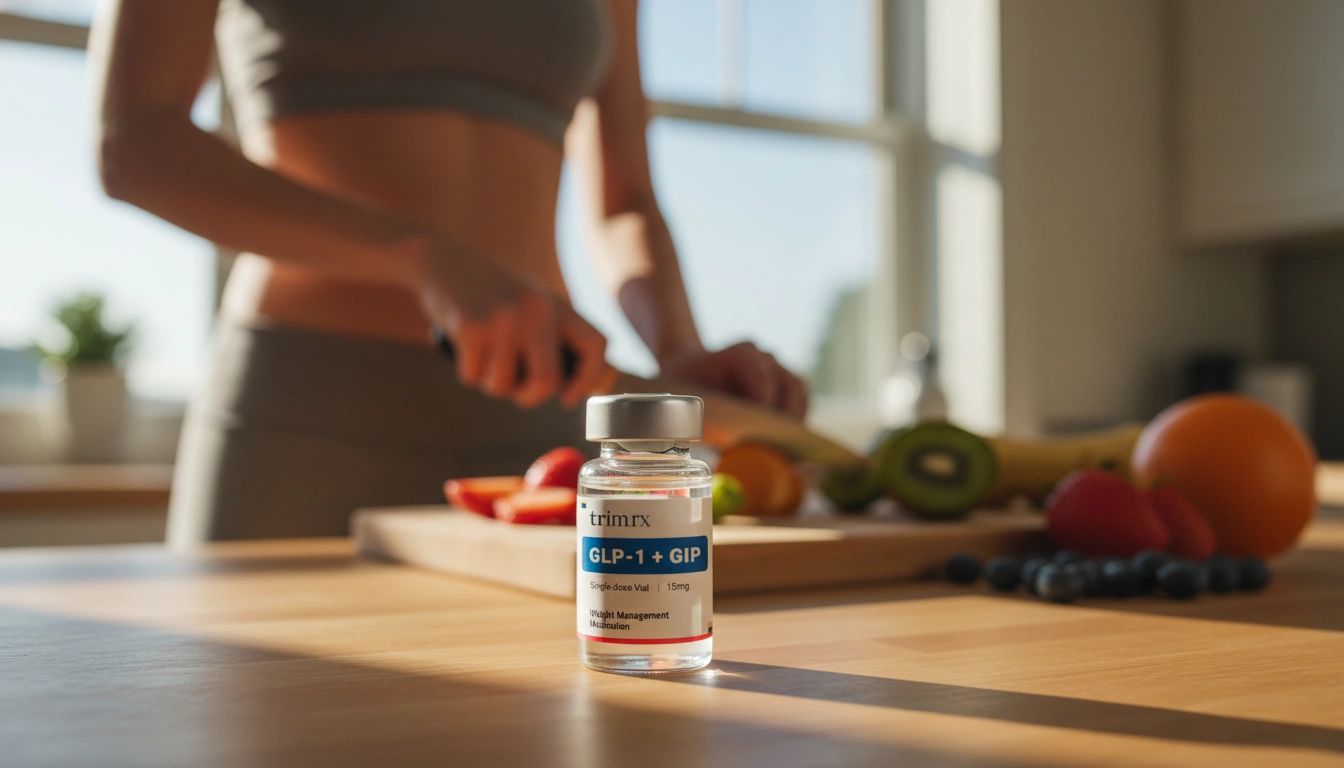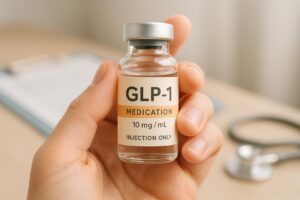What Happens When You Stop GLP-1 Injections?

Have you ever experienced the excitement of shedding excess weight, only to find yourself wondering what happens next? For many individuals using GLP-1 injections like Ozempic® and Wegovy®, the journey towards weight loss can be transformative. However, the reality is that stopping these medications brings its own set of challenges and questions. Understanding what occurs when we discontinue GLP-1 injections is crucial for anyone considering their weight loss options or currently navigating their personal weight loss journey.
At TrimRx, our mission is to support individuals in achieving sustainable weight loss through personalized and medically supervised programs. We believe that knowledge and awareness are essential components of any successful weight management strategy. In this article, we will explore the physiological changes that occur after stopping GLP-1 injections, the potential challenges individuals might face, and strategies to maintain weight loss.
Introduction
When we think about weight loss, we often envision a linear journey toward a healthier self. Yet, the reality is more complex. The arrival of GLP-1 agonists has significantly changed the landscape of weight management by providing effective tools to curb appetite and promote weight loss. These medications, which include semaglutide (Ozempic® and Wegovy®) and tirzepatide (Mounjaro®), have helped countless individuals find success on their weight loss journeys.
However, as with any medical treatment, the path does not end with weight loss. It is vital to understand the implications of discontinuing GLP-1 injections. What happens to the body, both physically and psychologically? Does the weight come back? And how can individuals effectively manage their health after stopping?
In this post, we will delve into the physiological and psychological aspects of stopping GLP-1 injections, including:
- The biological response to discontinuation
- Potential weight regain and its implications
- Strategies for maintaining weight loss
- The importance of lifestyle changes and support systems
By the end of this article, readers will gain a comprehensive understanding of the effects of stopping GLP-1 injections and how to approach their weight management journey with confidence.
Understanding GLP-1 Injections
What Are GLP-1 Injections?
GLP-1 (glucagon-like peptide-1) injections are a class of medications designed to help manage weight and improve metabolic health. Initially developed to treat type 2 diabetes, these medications have shown significant efficacy in promoting weight loss by mimicking the action of the naturally occurring GLP-1 hormone in the body. This hormone plays a crucial role in regulating appetite and glucose metabolism.
When administered, GLP-1 injections work through several mechanisms:
- Appetite Suppression: GLP-1 increases feelings of fullness and reduces hunger pangs, leading to lower food intake.
- Slowed Gastric Emptying: These injections slow the rate at which food leaves the stomach, prolonging the feeling of satiety.
- Insulin Regulation: GLP-1 helps regulate blood sugar levels by stimulating insulin secretion in response to meals.
How Effective Are GLP-1 Injections for Weight Loss?
Clinical trials have demonstrated that individuals using GLP-1 injections often experience significant weight loss. For example, studies have shown that participants can lose 15% to 20% of their body weight while on these medications, achieving not only aesthetic benefits but also improvements in metabolic markers such as blood sugar levels and cholesterol.
However, it’s essential to recognize that GLP-1 injections are not a cure for obesity; they are a tool that requires ongoing commitment and lifestyle changes to sustain long-term weight loss.
What Happens Physically When You Stop GLP-1 Injections?
The decision to stop GLP-1 injections can be influenced by various factors, including cost, side effects, or achieving weight loss goals. However, understanding the physiological responses to discontinuation is crucial for managing expectations and outcomes.
Appetite and Hunger
One of the most immediate effects of stopping GLP-1 injections is the return of appetite. As the medication’s effects wear off, many individuals report an increase in hunger and cravings, potentially leading to overeating. Research indicates that the appetite-regulating pathways activated by GLP-1 may become dysregulated once the medication is discontinued. This can result in an overwhelming urge to consume more food, which is often referred to as “rebound hunger.”
Weight Regain
Clinical studies have consistently shown that individuals who stop using GLP-1 injections may experience significant weight regain. For instance, data suggests that many people can regain two-thirds of the weight lost within a year after discontinuation. This phenomenon is not unique to GLP-1 medications; it is a common challenge faced by anyone who undertakes a weight loss journey without establishing lasting lifestyle changes.
Changes in Metabolic Health
The discontinuation of GLP-1 injections can also impact metabolic health markers. Studies have indicated that individuals may see a return to previous levels of blood pressure, blood sugar, and cholesterol levels after stopping the medication. This rebound effect underscores the importance of continuous monitoring and management of metabolic health, particularly for those with underlying conditions such as type 2 diabetes.
Body Composition
Another critical aspect to consider is the potential change in body composition after stopping GLP-1 injections. When individuals regain weight, they may not only regain fat but also lose muscle mass. This shift to a higher fat-to-muscle ratio can have adverse effects on metabolic health, as muscle plays a vital role in maintaining a healthy metabolism and overall well-being.
Psychological Considerations
Mental Health and Weight Management
The psychological impact of stopping GLP-1 injections can be profound. Many individuals may experience feelings of disappointment or frustration as they face the challenges of weight regain. The concept of weight cycling, or “yo-yo dieting,” can have negative effects on self-esteem and body image, making emotional support essential during this transition.
The Importance of Support Systems
At TrimRx, we understand that weight loss is not merely a physical journey but also an emotional one. Building a support system can help individuals navigate the psychological challenges of discontinuing GLP-1 injections. This may include working with healthcare professionals, such as registered dietitians or mental health counselors, who can provide guidance and encouragement.
Strategies for Maintaining Weight Loss After Stopping GLP-1 Injections
While the challenges of stopping GLP-1 injections are significant, there are strategies individuals can adopt to maintain weight loss and support overall health.
1. Establish a Sustainable Eating Plan
Maintaining a balanced and nutritious diet is critical after discontinuing GLP-1 injections. Focus on whole foods rich in fiber and protein, which can help promote feelings of fullness. Incorporating a variety of fruits, vegetables, whole grains, and lean proteins ensures that your body receives the nutrients it needs while minimizing cravings.
2. Stay Active
Regular physical activity is essential for maintaining weight loss and promoting overall health. Aim for at least 150 minutes of moderate-intensity exercise each week, including both cardiovascular activities and strength training. Finding enjoyable forms of exercise can enhance adherence and make physical activity a sustainable part of your lifestyle.
3. Monitor Your Progress
Tracking your food intake, physical activity, and weight can provide valuable insights into your progress and help identify patterns. Consider using apps or journals to log your meals and workouts, which can help you stay accountable and motivated.
4. Seek Professional Support
Engaging with healthcare professionals can provide tailored guidance and support. At TrimRx, we offer personalized weight loss programs that include medical supervision, consultations, and unlimited support to help individuals navigate their weight loss journey effectively.
5. Focus on Mental Well-being
Incorporating mindfulness practices, such as meditation or yoga, can enhance mental health and resilience. Building a positive mindset around food and body image can be empowering and help individuals cope with challenges more effectively.
6. Consider Alternative Treatments
If weight regain becomes a concern, discussing alternative weight management options with your healthcare provider can be beneficial. Options may include different medications, behavioral therapy, or even surgical interventions, depending on individual circumstances.
Conclusion
Discontinuing GLP-1 injections can lead to a range of physiological and psychological changes that individuals must navigate. Understanding what happens when you stop these medications is vital for effectively managing weight and maintaining overall health. While the challenges are significant, adopting sustainable lifestyle changes, seeking support, and staying informed can empower individuals on their weight loss journeys.
At TrimRx, we are dedicated to providing personalized, medically supervised weight loss solutions that emphasize safety, effectiveness, and empathy. Our commitment to continuous support ensures that every individual can achieve their goals and embrace a healthier lifestyle.
By taking proactive steps and understanding the complexities of weight management, we can work together to create a sustainable path forward—one that recognizes the importance of both physical and mental well-being.
FAQ
Can I maintain my weight loss after stopping GLP-1 injections?
Yes, it is possible to maintain weight loss after discontinuing GLP-1 injections by adopting a balanced diet, staying active, and utilizing support systems.
How quickly will I regain weight after stopping GLP-1 injections?
Many individuals experience weight regain within the first year after discontinuing GLP-1 injections, often regaining two-thirds of the lost weight.
What support options are available for those discontinuing GLP-1 injections?
Support options include working with healthcare professionals, registered dietitians, and mental health counselors who can provide guidance and encouragement.
Are there alternative treatments available for weight management?
Yes, alternative treatments may include different medications, behavioral therapy, or surgical interventions. Discussing these options with a healthcare provider can help identify the best approach for your individual needs.
Can lifestyle changes help prevent weight regain after stopping GLP-1 injections?
Absolutely! Sustainable lifestyle changes, including a balanced diet and regular physical activity, play a crucial role in maintaining weight loss and supporting overall health.
How can I find out if GLP-1 injections are right for me?
Taking our free assessment quiz at TrimRx can help determine your eligibility for personalized weight loss programs, including GLP-1 medications.
By understanding the implications of stopping GLP-1 injections and taking proactive steps, we can navigate the path to sustainable weight management together.

Transforming Lives, One Step at a Time
Keep reading
Tracking Progress With GLP-1: What To Measure
Learn which metrics to track on GLP‑1 therapy—weight, waist, blood sugar, lipids, side effects, and non‑scale wins—and how often to monitor them.
Fatigue Solutions for Ozempic and Wegovy Users
Hydration, protein-rich meals, light activity, and better sleep can reduce medication-related fatigue and help maintain energy during weight-loss treatment.
GLP-1 Medication Side Effect Checker
Worried about GLP-1 medication side effects? Use our free checker for Semaglutide, Liraglutide, and more to learn what to expect and stay informed!



